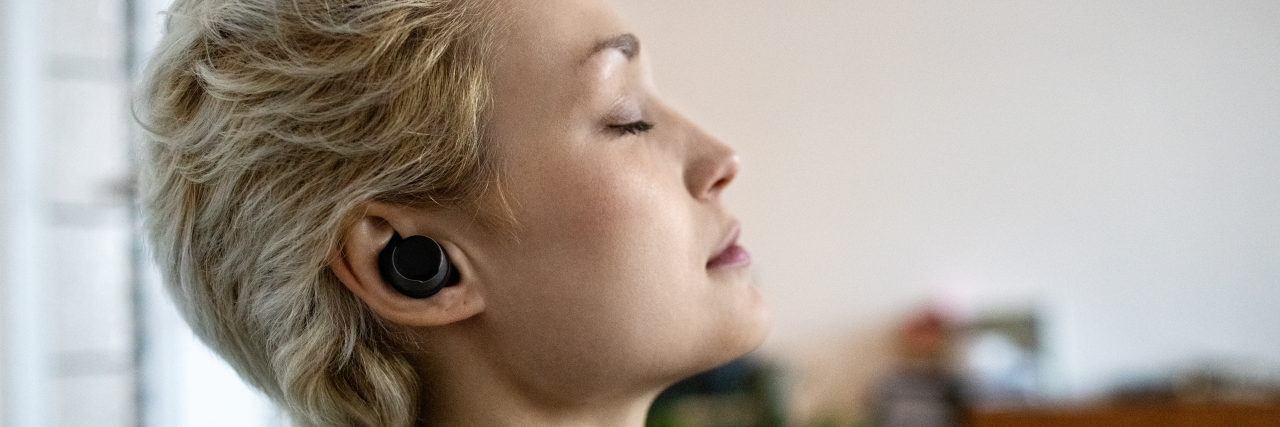When I Learned That My Trauma Makes It Hard For Me to Breathe Deeply
In 2018, I saw a neurologist for the first time, hoping to take another step towards a diagnosis. At one point during his examination, he asked me to “breathe normally.” I calmed my mind and did my best to breathe “normally.” After a few seconds, he stopped me, saying, “No, no, just breathe as you normally would.”
I was taken aback, as I felt I was breathing calmly, evenly, and deeply enough for my breathing to be considered “normal.” When I changed the way I was breathing to try to make it more “normal,” the neurologist stopped me again and told me now I was hyperventilating. I was so frustrated and embarrassed that I nearly started to cry.
This experience left me bewildered. Did I not know how to breathe? How could I not know how to breathe? After all, breathing is automatic. But the more I thought about it, the more I realized I truly didn’t know how to breathe. I hadn’t been breathing for most of my life — not fully anyways. For years — decades, even — I rarely took a full, nourishing breath of air.
I remember going to day camp around 7 years old and being so proud of how well I could hold my breath, breathe without moving a muscle, and stay still longer than any other kid at camp. Sometimes these skills allowed me to win games or contests that the counselors arranged. But it wasn’t until after my neurologist appointment that I started analyzing this memory and putting the pieces together.
Where did I learn these special skills that no other child at day camp seemed to possess? What made me the best at staying still, hiding, and breathing in a way that leaves me undetectable? The answer was obvious, even before I wanted to admit to myself. Rather than learning the skills a healthy child would, I had learned the skills of a prey animal. I was hypervigilant and invisible. By my teens, I’d minimized the trauma of my childhood, decided I was OK, and “moved on.”
But the fear still lived inside me, controlling my breath (among other things) for years to come.
When I was 14, I started having what I called “breath attacks,” which were most likely panic attacks or emotional flashbacks. I could breathe out, but I felt like I couldn’t inhale, even though I was aware that there was no obstruction or barrier to doing so. And since I was aware that I “should” be able to breathe, I convinced myself I was faking my breath.
In early adulthood, when I started using cannabis as treatment for my mental health, one of the first things I noticed was that it felt like I could breathe. In fact, it actually felt as though I was fully breathing for the very first time. That kind of relief felt like a miracle, but it didn’t last. Like most medication, the cannabis waned in effectiveness over time, and the tightness that kept me from breathing fully returned.
By the time I saw the neurologist, I had assigned all of the unpleasant physical sensations causing and caused by my inability to breathe fully as “anxiety.” And to some extent, this label is fairly accurate. However, I stopped assessing the physical sensations I experienced, which caused me to miss the obvious: If I’m not breathing fully, I can work on breathing more fully. My experience at the neurologist helped me connect the dots between my breath and my trauma and also helped me understand the piece of the puzzle that is my overall health.
Over the last two years, I have tried a variety of breathing exercises and meditations and worked to expand overall awareness around my breath. I have used physiotherapy, massage, and yoga to loosen the muscles around my chest, shoulders, back, and abdomen. Practicing breathwork has also dredged up some of the trauma and unprocessed emotions that have lived in my body for so long, which means that working on breathing more fully has also meant embracing trauma work and participating fully in my recovery.
So in some ways, things in my life have gotten easier, including breathing more fully more often. As I keep practicing, breathing deeply becomes easier, and I’ve also gained some relief for both my physical and mental symptoms.
In some ways, though, things are more difficult. Sometimes breathing fully means allowing myself to cry, deeply experiencing grief, or admitting to myself or to others that I’m upset, which can be inconvenient and uncomfortable but is also part of having healthy emotional habits.
Reprogramming breathing patterns requires long-term, consistent efforts. Whenever I lose my focus, I can feel the results within the first day. My breathing transitions back to a slow, shallow pace, and I occasionally pull in a deep breath like a swimmer going underwater. My chest, my stomach, and my shoulders grow tense and, if unresolved, they begin to cause me pain. Whenever I lose my focus, I’m reminded that my body is still hard-wired to be alert and undetectable, and it’s going to take a lot more time and consistency to rewire those instincts. But I don’t mind that it will take a long time — even if it takes my entire life. I feel comfort in knowing that every moment and every day, through every breath, I have a new opportunity to work towards recovery and improve my health.
Getty image by Luis Alvarez.

